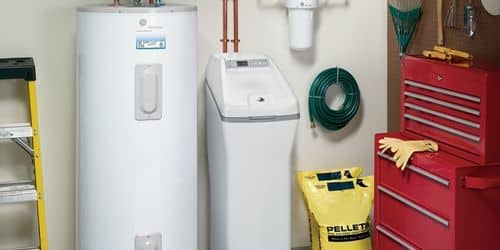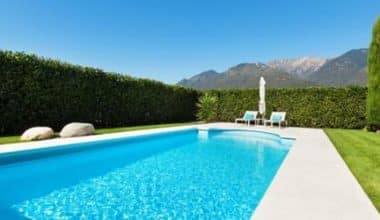Depending on where you reside, your water may contain calcium, magnesium, and other minerals that contribute to hardness, which in turn makes it unhealthy. What’s more, your skin may react to it. Generally, hard water can damage your kitchen and bathroom surfaces, irritate your skin and hair, and damage your equipment. However, you can treat it by using a high-quality water softener system. Since you may not have the time to evaluate the capacity, efficacy, and simplicity of the installation of a large number of water softener systems, we did, and here’s the result of consumer reports on the water softener.
Best Water Softener Systems
Coated resin beads in water softeners, which have a negative ion charge, pull and capture the calcium and magnesium ions that create water hardness (which have a positive charge). These impurities stick to the resin when the cleaned water travels through the plumbing system in your home and the resin bed.
#1. GE GXSH40V Water Softener
First on our list of water softener systems is the GE GXSH40V water softener. Most four-person homes may use the GE GXSH40V’s 40,200-grain capacity. It has GE’s SmartSoft technology installed, which enables the system to identify trends in water usage and optimize regeneration schedules to make sure that softened water is available at times of peak demand, including when your family is rushing to take morning showers or when eating supper. It takes about two hours and 37 liters of water to complete regeneration.
We chose this water softener as our top pick for many reasons other than just its innovative features. This model’s installation is quicker than that of other water softeners on the market, taking about 30 to 1 hour. One of the most notable characteristics of the GE GXSH40V is its mixing valve, which enables you to change the water’s hardness to meet your needs. Using the computerized controller, you may adjust the water’s hardness level, cut back on salt use, or boost its softness to your liking. The controller will also send you a “Days to Empty” alert that will notify you right away when it’s time to restock the 230-pound salt container.
#2. Waterboss Model 900 36,400 Grain Water Softener
The Waterboss 900 is next on our list of water softener systems. You can get it at a reasonable price. However, depending on filtering abilities and features, water softening systems frequently exceed $500 or $1,000. This tiny, reasonably priced water softening system may handle the water needs of a typical three to four-person family while still being inexpensive.
This water softener has a 36,400-grain capacity and can filter water with a hardness of up to 90 GPG. It is remarkable that the regeneration cycle only uses 17.2 gallons of water and takes 24 minutes. The settings and regeneration of the softener are managed via an easy-to-use computerized controller. Like many other water softeners, this little one incorporates a bypass valve to extend the life of the media.
#3. GE GXMH31H 30,000 Grain Water Softener and Filter in One
Third, on our list of water softener systems is the GE GXMH31H. When combined with water filtration components, a water softening system can reduce the mineral content of your water while also improving its taste and odor. The GE GXMH31H Water Softener and Filter in One complete both jobs with just a simple setup.
Before regeneration, this water softener system could filter 31,100 grains and reduce hard water to 120 grains per gallon. Regeneration can be time-consuming, taking anywhere between 105 and 152 minutes, and utilizing far more water than similar softeners do (54.7 gallons). The GE Water Softener and Filter in One uses a special mixing valve to reduce chlorine taste and odor in your water while also softening it to the desired hardness.
#4. Aquasure Harmony Water Softener with Fine Mesh Resin for Iron Removal
The last on our list of water softener systems are the Aquasure Harmony system with fine mesh for resin. A water softener for well water typically comes with an iron filter as well. This additional filter addresses the unique needs of homes using well water while reducing the occurrence of iron and rust stains on sinks, tubs, and toilets.
The Harmony series from Aquasure uses fine mesh resin to capture minerals like calcium, magnesium, and iron. It can filter water with a hardness of up to 110 GPG. Choose a water softener that has a 32,000, 48,000, or 64,000 GPG filtering capacity before it’s time to recharge it.
Is It Ok To Drink Softened Water?
Water with a sodium value of up to 200 ppm, according to the Drinking Water Inspectorate (DWI), is safe to consume. The softened version is unlikely to go above this unless your water is quite hard, to begin with.
Best Water Softener Systems for Well Water
We have approximately ten years of experience testing water softening equipment. This guide includes our top picks for using private well water. These are the best in terms of technology, efficacy, flow rate, and, of course, cost.
#1. SoftPro Elite Water Softener for Well Water
If you get your drinking water from a private well, then you undoubtedly already know everything there is to know about well water filters. A well water softener, though, might be something you’re considering.
Some well water sources are harder or have more iron than others, much like city water. Your water’s flavor can be improved, you can save money, and your plumbing and appliances will last longer if you use a water softener. High iron and hardness levels can cause a variety of domestic practical problems.
#2. Springwell SS Salt-Based Water Softener System
Our research indicates that if you’re looking for a well water softener that offers a highly trustworthy ion exchange performance, the Springwell Salt Based Softener is your finest whole-house option. This neoprene-wrapped water softener provides the best water treatment for your home at a reasonable cost. For added security, it has a lifetime warranty.
The well-known and effective ion exchange approach is used by the Springwell Salt Based Softening System to soften water by exchanging the ions that cause water hardness with sodium ions. By using less salt during each regeneration cycle, our clever softening system can help you save money.
#3. Springwell Futuresoft’s Salt-Free Water Softener
The Springwell Futuresoft Water Softener is a state-of-the-art saltless water softening device that offers 99.6% scale prevention. This device, which is among the best environmentally friendly choices available, conditions gallons of water without reducing your home’s water pressure and produces no waste. Futuresoft uses TAC (Template Assisted Crystallization) to crystallize hardness minerals, preventing any surface adhesion.
#4. Springwell Tannin Softener System
The most specialized system for hard well water with tannin contamination is the Springwell Tannin Softener Solution. This softener eliminates hardness minerals and produces drinking water that looks and tastes better all in one system. There are two sizes of the Springwell Tannin Softener System, with flow rates of up to 15 GPM. The technology automatically backwashes and regenerates with little work from you.
Best Water Softener Consumer Reports
The filthy and impure water supply affects humans and causes several health problems. Your life will be made easier, your detergent will last longer, and there are many positive health effects of using a water softener. Water softeners use ion exchange as a technique to soften hard water. Based on consumer reports, the following are some o the best water systems softener;
#1. AFWFilters Fleck 64k, 64,000 Grains, Blue Water Softener
The first consumer reports water softener on our list is AFWFilter Fleck. The AFWFilters Fleck 64k water softener removes calcium and magnesium from hard water, reducing the efficacy of soap. Your plumbing will last longer since it removes the calcium and magnesium ions that produce hard water.
These three advantages are provided by the flow meter utilized by its system.
- Make a water count.
- If necessary, regenerate
- Don’t use salt.
- minimizing water wastage
They will deliver all the components needed for the operation to your door.
#2. AFWFilters IRON Pro 2 Combination Water Softener Iron Filter, Fleck 5600SXT Digital Metered Valve For The Entire House
The second in our list of consumer reports best water softener systems is the AFWFilter Iron Pro. It’s yet another water softening appliance I might advise you to get. It’s an excellent product in terms of both value and quality. The water is softened because it influences your entire residence. It comes with a lot of features that make maintenance easier. Its system includes
- Flow-meter softener Fleck 5600 SXT
- U.S. Black Tanks
- Male threaded bypass of one inch in noryl plastic
- Barb 3/4″ Drain
- Upgrade for paddlewheel meters
- An overview elbow for a brine tank
- Safety Float
It features an embedded capacitor that keeps the memory active for up to 48 hours and a metered softening valve that monitors the water you use and regenerates it as necessary to reduce salt and water usage, and that is what I like best about it.
#3. Whole-House Water Filter System EcoPlus and Salt-Free Water Softener
The next consumer reports water softener system on our list is the whole house water filter system. If your area has hard water, you might need a dependable water filter system that does both jobs—provides your family with clean water and removes the minerals in hard water.
- Cleanse the water.
- The hard water minerals should be eliminated.
- It will enhance the flavor of your water and help you resolve your present water-related issues.
#4. Eddy Electronic Water Descaler is a Water Softener Substitute
The last on consumer reports water softener system on our list is Eddy Electronic. The installation of this water softener is the primary problem; compared to other water softeners, it takes a little longer to install, but no plumbing adjustments are required. Electromagnetic waves created by eddy electronic water softeners aid in reducing the formation of scale in your pipes.
Its quality is good, but you might notice that the water is not as softened as it is with other water softeners. It’s still a nice water softener, so you might want to get it. Therefore, be sure to check it out on Amazon by clicking the provided link. If you receive a defective product, they will replace it or offer you a lifetime repair warranty.
Does it Matter Which Water Softener to Buy?
What sort of salt you use in your water softener matters. Although all salts will soften hard water, pellet salts will do so more successfully due to their higher purity.
Best Water Softener Systems for Florida
Numerous water treatment systems exist in Florida, and they are absolutely important. Since the state’s well-known limestone substratum causes water hardness, Florida is noted for its contaminated water. If hard water is present in your home’s water supply, you should endeavor to modify it because no homeowner enjoys dealing with the effects of hard water on their home. A few water treatment technologies can help with Florida’s water hardness issues, which is good news. Continue reading below to learn more about Florida’s numerous water treatment alternatives.
Types of Water Treatment Systems in Florida
If you live in Florida and must deal with the effects of hard or contaminated water, use a good water treatment system. Following is a list of the top types of water treatment systems:
#1. Whole House Water Filters
If your home is connected to a municipal or well source, whole house water filters can be used to treat the water there. There are many different models of whole-home water filters, and you may have them customized for your particular water issues. Depending on your water’s hardness, color, odor, chlorine levels, and pollutants, you can change it. As you can see, there are several advantages to using this water filter system. Whole-home water filters can be replaced with point-of-use appliances that you can attach to a pipe or a fixture because they improve the quality of the water supply.
#2. Water Distillation
Boiling helps to remove contaminants from the water through the water distillation process. Water may be purified exceptionally well with this method. However, this water treatment is not very well-liked among family users because it also removes many of the beneficial characteristics of the water while only creating a small amount. The greatest water treatment method to use if your immune system is compromised is distillation. It can obstruct the entry of microorganisms into the body, which could lead to several grave health issues.
#3. Activated Carbon Filters
This water treatment system uses carbon particles to trap different organic contaminants. Professionals frequently install carbon filters underneath sinks. These can also be used as a whole-house system. Using this treatment is the simplest approach to getting rid of smells and improving the flavor of your water.
#4. Reverse Osmosis
The reverse osmosis water treatment helps to remove dissolved inorganic particles by using a semi-permeable membrane. It successfully purges water from particulates, chlorine, pesticides, and bacteria. This is a common technique for improving the flavor and odor of cooking and drinking water. In Florida, if you get your water from a well, you can also use this method to purge the water of microorganisms. Additionally, reverse osmosis tends to remove important elements like fluoride from water.
#5. A Water Softener
Water softeners are a pretty common sort of water treatment equipment when it comes to treating hard water. This system uses salt-based ion exchange devices to remove unwanted minerals from water that contribute to water hardness and cause limescale deposits to accumulate on household fixtures. If you’re looking for an environmentally responsible treatment, using salt-free systems would be a great choice. These use less water and generate less waste. Your home’s water system can be upgraded with water softeners. This process softens any water that enters the plumbing system of your home.
#6. UV Disinfection
Not least among all the methods for treating water and getting rid of all microorganisms is UV disinfection. UV light is used in this procedure to clean your water of bacteria and algae.
Salt-Free Water Softener
Contrary to popular opinion, hard water minerals cannot be successfully removed by salt-free water softening systems. Some individuals believe that the only difference between the two is whether or not salt is used. In reality, salt-free water softeners do not soften the water; rather, they only “condition” it.
Comparing Salt-Based and Saltless Water Softeners
Magnesium and calcium are attracted to and removed from the water supply by negatively charged resin beds used in salt-based water softeners, as was already described. Some water softeners also utilize salt to clean the water softener and renew the resin bed. When sodium ions with positive charges take the place of the hard water minerals that had been entrapped in the resin bed during regeneration, the hard water concentration is released down the drain.
Hard water minerals are not removed by salt-free water softeners, though. Instead, to avoid scale formation and surface adhesion, they chemically modify the magnesium and calcium. Because salt-free water softener systems do not trap the minerals in hard water, neither salt nor a regeneration cycle is required to flush the minerals down the toilet.
The definition of water softening requires that hard water minerals be REMOVED, whereas the salt-free method only ALTERS the minerals, allowing them to remain in the water. This means that salt-free water softeners are not softening water; rather, they are for “water conditioning.”
Why a “Water Softener” That Uses No Salt is Bad
An appropriate compromise could initially seem to be a salt-free water softener. For one thing, they don’t make you consume more sodium. Second, they appear to have comparable overall results to a water softener that uses salt (note the emphasis on “seems”). And finally, the ease of usage and lack of recurring salt replenishment of a saltless water softener may appeal to certain people.
While less effective, a salt-free water softening system costs more (specifically, the potassium pellets they use are more expensive). They require less care because they don’t work as hard.
Is Salt-Free Water Softener Better?
The option is simple because only salt-based water softeners have been demonstrated to result in softer water, healthier skin, and no soap scum or scale forming. A system based on salt yields superior returns on investment.
Kinetico Water Softener
Water softeners from Kinetico are designed to address the problem and soften your water while taking up the least amount of space feasible in your home.
Our methods are very carefully designed to eliminate limescale problems.
To satisfy your water needs, Kinetico softeners, stylish cabinets that are made to last, and small to large systems that are sure to fit the space available. Highly efficient, requiring the least salt and water, Non-electric, allowing installation to occur where it is most appropriate for the home rather than being constrained to a site with an electrical connection
Kinetico systems remove more impurities, perform better, and have lower life-cycle expenses.
Complete Your Home System
A Kinetico full home water treatment system combines a Kinetico drinking water system with a Kinetico water softener or conditioner, which treats the “working water” you use for tasks like cleaning and washing. It’s a sensible, dependable solution that guarantees consistently excellent water in your home.
How a Kinetico Water Softener Works
Hard water is softened through ion exchange, a process that removes the minerals that give water its hardness. When hard water is put into the water softening system, ion exchange occurs in the resin bed. To soften the water, sodium ions take the place of calcium and magnesium hardness ions. You can now use soft water throughout your entire home.
After the hardness ions have filled the resin bed, regeneration or cleaning is necessary. Typically, salt is used to clean the resin beads throughout the regeneration process. The water softening method comes after the cleansing step.
What is the Average Cost of a Whole House Water Softener System?
A whole-home water softener installation costs, including materials and labor, an average of $1,500
How do I know which water softener to buy?
Calculating the typical number of gallons your household uses each day will help you choose the optimum size water softener for your home. This amount can be calculated by dividing the total number of persons living in your home by the daily average for the number of gallons consumed (usually around 75).
What is the best system to treat hard water?
Using a water softener is the most typical method of treating hard water. This water filtration device removes the minerals from your water that make it hard. When water enters the filter, it passes through a resin-filled bed that catches calcium and magnesium ions, which are subsequently swapped out for sodium ions.
How much is a good water-softening system?
A whole-home water softener installation costs $1,500 on average, including materials and labor. The price of the procedure could range from $500 to $6,000 depending on the kind of system you select.
What is the downside of a water softener?
The potential health implications for individuals who may be following low-salt diets are the main drawback to water softening. For each gpg of hardness eliminated, salt is added in 7.5 milligrams per quart in replacement for hardness minerals. The homeowner’s diet is also depleted of calcium and magnesium.
Can you drink softened well water?
Water that has been softened is safe to drink, but it’s vital to first determine how hard the water is. It is safe to drink if it is less than 400 ppm. You will need to install a reverse osmosis filter if it is higher than 400 ppm in order to remove the sodium levels.
What is the life expectancy of a water softener?
Depending on the kind and caliber you choose, water softeners can last anywhere between 10 and 20 years. A Kinetico system can last up to 20 years, but a single tank electric water softener typically lasts up to 12 years. No appliance, though, is everlasting.
Which is the Best Hard Water Softener?
- Whirlpool 40,000 Grain Water Softener (WHES40E).
- 36,400-Grain Water Softener System by Waterboss.
- Rheem Preferred Water Softener with 32,000 grains
- On The Go Portable 16,000 Grain RV Water Softener.
- Heavy Duty Water Softener with 80,000 Grain Pelican Water.
Conclusion
Water softeners are the perfect treatment for hard water. Rather than deal with the harsh effects of hard water, you can treat your water with consumer reports water softener systems.
Best Water Softener Systems FAQs
How can I soften water without a water softener?
One of the best methods to soften water is by boiling it. Hard water minerals, such as calcium and magnesium, will sink to the bottom as a result of the boiling.
Is it bad to oversize a water softener?
An enormous water softener will have the capacity to treat every gallon of water used for hardness, but it may be less effective and efficient at low flow rates due to channeling if the unit is not properly sized.
- Alkaline Water Brands: What Are They & The Best 21 Picks
- LAUNDRY PRODUCTS: List Of Best Laundry Products
- WATER HEATER BRANDS: The Most Popular Brands and Reviews in 2023
- High Water Mark: All you need to know + Best practices






